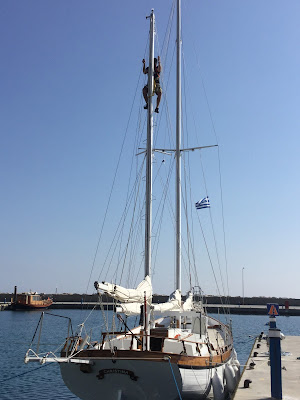I was checking out the rig on our own boat today at Samos Marina in Greece.
A Rig Survey is recommended before you carry out any period of extended cruising or when your Yacht’s Rigging Wires (standing rigging) are more than a few years old. Some Insurance Companies will require that you replace your rigging wires every ten years, other Insurance companies will only continue to insure you if you have a Rig Survey.
There are basically two methods of surveying the rig, with the mast stepped (standing) or un-stepped (lowered). The most effective method of surveying the rig is to un-step the mast and inspect the spars when supported horizontally on stands. This should be done periodically during the life of a sailing yacht. Interim inspections can be carried out with the rig stepped (standing).
Insurance companies will generally not expect a rig to be un-stepped for inspection, so at Insight Marine Surveys the Rig Survey for insurance generally involves the surveyor going up the mast (See pic - inspection from aloft).
Insight Marine Surveys carry out Rig Surveys on all types of rigs throughout the Greek islands. We have experience in surveying spars constructed of different materials including; Aluminium alloy, carbon, wood and steel. We hold qualifications in marine surveying and are members of surveying organisation; International Institute of Marine Surveying (IIMS).
Rig surveys for yachts up to and around 12 metres or about 40 feet are normally completed within two or three hours. Rig Surveys on larger yachts with multiple spars are generally completed within one day.
The Rig Survey includes an inspection of the following:
Rig Survey Equipment
Mast(s), including mast base, cap and tangs
Boom(s) and fittings
Rigging wires (standing rigging)
Rigging terminals
Turnbuckles (rigging screws) wire locking and split pinning
Chain plates
A report is provided explaining the findings of the Rig Survey. Within the report, problems found during the survey are listed and information is given on their importance and recommendations for repair.



No comments:
Post a Comment
Hi, how can I help?